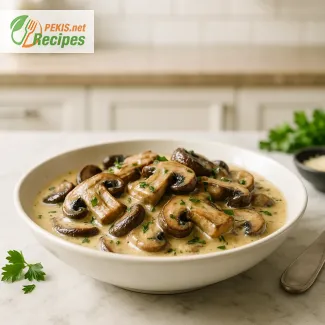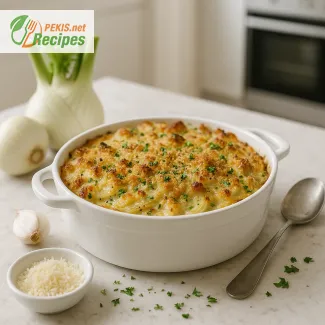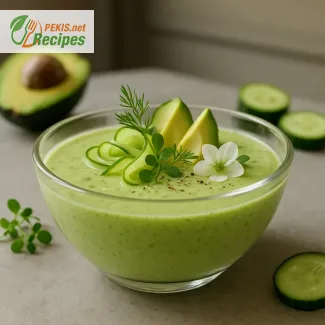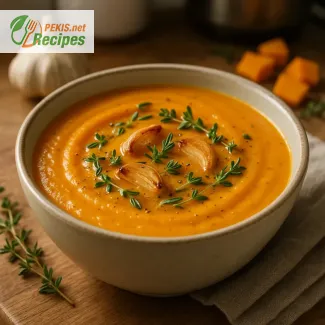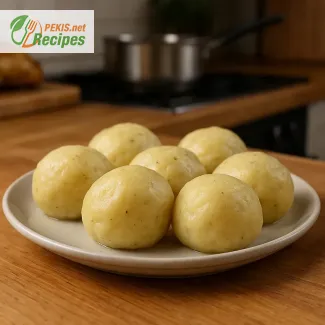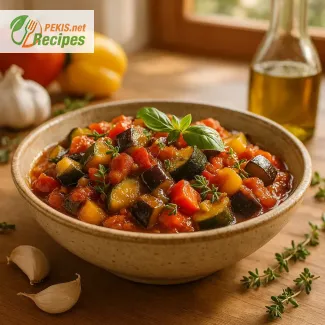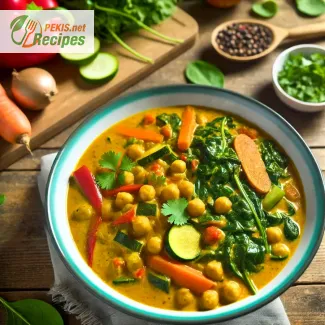
Vegetable Curry with Chickpeas and Spinach is a truly delightful and nutritious dish that brings together vibrant flavors, a variety of textures, and an array of nutritional benefits. This curry is ideal for anyone seeking a wholesome, filling meal that doesn’t compromise on taste. With the deep, comforting warmth of spices, the creamy, smooth coconut milk, and the satisfying, hearty texture of chickpeas and fresh spinach, this dish is an ode to plant-based cooking at its finest. Let’s dive into what makes this vegetable curry truly stand out and a must-have on any table.
The Perfect Harmony of Flavors and Textures
The base of this vegetable curry is rich and inviting, simmered in a luscious coconut milk sauce that balances the earthiness of garam masala and curry powder with a hint of spiciness from fresh ginger, garlic, and sometimes a little chili. These elements not only add depth and complexity but also work together to enhance the natural sweetness of vegetables like carrots, bell peppers, and zucchini. The carrots and zucchini add a mild sweetness and slight crunch, while bell peppers bring a touch of tanginess, adding balance to the overall flavor profile.
Chickpeas are the heart and soul of this dish, adding a delightful texture and a boost of plant-based protein, making this curry both nourishing and filling. They provide a gentle, nutty undertone that complements the bold spices and coconut milk base. Spinach, on the other hand, offers a light, leafy texture and a burst of green freshness. It subtly wilts into the curry as it cooks, absorbing the flavors of the spices while adding valuable nutrients like iron, vitamins A, C, and calcium.
Nutritional Powerhouse
One of the biggest attractions of this vegetable curry is its impressive nutritional profile. This dish is packed with fiber, essential vitamins, and minerals. Chickpeas are rich in fiber and protein, both of which help you stay full for longer and are excellent for digestive health. Spinach adds a wealth of antioxidants and is particularly high in iron and calcium, essential minerals for maintaining energy levels and bone health. The vegetables included bring their own set of phytonutrients and vitamins that help support a healthy immune system and overall wellness.
Additionally, this dish is dairy-free, gluten-free, and vegan, making it an inclusive choice that caters to various dietary preferences and needs without sacrificing flavor or satisfaction. The use of coconut milk not only adds a creamy, rich texture but also introduces healthy fats that contribute to heart health and provide a sustained source of energy.
Preparation, Serving, and Storage
One of the beautiful aspects of this vegetable curry is its versatility and convenience when it comes to meal prep. This curry can be made in advance and, in fact, benefits from being prepared a day before serving, allowing the flavors to meld and deepen overnight. Prepare the dish up to 48 hours in advance for maximum convenience without any compromise on freshness.
When it comes to serving, this curry is incredibly versatile. It pairs beautifully with steamed rice, quinoa, or naan bread, making for a satisfying, complete meal. For an added touch of freshness, garnish with freshly chopped cilantro or a squeeze of lime juice to brighten the flavors just before serving.
Storage of this dish is easy and convenient. After cooking, allow the curry to cool to room temperature before transferring it into an airtight container. Refrigerate for up to 5 days, or for longer storage, portion it into freezer-safe containers and freeze for up to 3 months. When ready to enjoy, simply reheat on the stove over medium heat, stirring occasionally until heated through. If reheating from frozen, thaw the curry in the refrigerator overnight before warming it up for the best results. This method ensures that the texture and flavors remain intact, providing a freshly made feel even on subsequent days.
The Ideal Comfort Food for Any Occasion
Whether it’s a cold evening, a busy weekday, or a relaxed family gathering, this vegetable curry with chickpeas and spinach is perfect for any occasion. It’s deeply comforting, satiating, and brings a touch of exotic spice and warmth to the table. The simplicity of preparation, combined with its nutritional value, makes it a go-to meal for busy individuals and families alike. With every bite, you get to experience a medley of tastes—from the sweet and slightly earthy chickpeas to the fresh, green essence of spinach and the creamy, spiced coconut base that ties everything together.
Incorporate this delicious, nutrient-dense curry into your weekly rotation, and it’s sure to become a favorite.
- Heat the Oil: In a large pot, heat 1 tablespoon of olive oil over medium heat. Add the finely chopped onion and sauté for about 5 minutes until it becomes soft and translucent.
- Add Garlic and Ginger: Add the minced garlic and grated ginger to the onions, stirring for another 2 minutes until fragrant.
- Sauté Vegetables: Add the diced bell pepper, zucchini, and sliced carrot to the pot. Cook for about 5-7 minutes, stirring occasionally, until the vegetables begin to soften.
- Incorporate Spices: Add the curry powder, ground cumin, ground coriander, turmeric, and paprika. Stir well to coat the vegetables with the spices, cooking for 1-2 minutes to release their aroma.
- Add Tomatoes and Chickpeas: Pour in the canned diced tomatoes and chickpeas. Stir to combine all ingredients thoroughly.
- Add Coconut Milk: Pour the coconut milk into the pot and mix everything together. Bring the mixture to a gentle boil, then reduce the heat and let it simmer for about 15-20 minutes, or until the vegetables are tender.
- Add Spinach: Add the fresh spinach leaves and stir them into the curry. Allow them to wilt into the mixture, which should take 2-3 minutes.
- Season with Salt and Pepper: Add salt and black pepper to taste, adjusting as needed.
- Serve: Once the curry is well mixed and the spinach has wilted, remove from heat. Serve hot with steamed rice, quinoa, or naan.
Enjoy this delicious Vegetable Curry with Chickpeas and Spinach as a nutritious, hearty meal that’s perfect for any occasion, made easy for storing, reheating, and meal-prepping for busy days ahead!
The Vegetable Curry with Chickpeas and Spinach recipe provides a balanced combination of essential vitamins, minerals, and macronutrients that promote overall health and wellness. This dish is not only flavorful but also brings substantial nutritional benefits, supporting everything from immune function to digestive health and energy levels. Let's explore in detail how the ingredients and nutrients in this recipe positively impact the body and why it could be a valuable addition to a regular diet.
Nutritional Benefits of Key Ingredients
This curry is packed with vegetables, chickpeas, and spinach, all of which offer an impressive array of nutrients.
- Chickpeas:
- Chickpeas are an excellent source of plant-based protein, making this curry filling and satisfying. They provide essential amino acids, which are the building blocks of protein and vital for muscle repair, immune function, and hormone production.
- Rich in fiber, chickpeas contribute to improved digestive health, aiding in regularity and preventing digestive issues like constipation. Fiber also helps regulate blood sugar levels by slowing down digestion and reducing the absorption of sugar, making this dish ideal for those managing blood sugar levels.
- Vitamin B6 and Folate (B9): Chickpeas are high in these B vitamins, which are essential for brain health and can reduce the risk of neural tube defects during pregnancy. They also support metabolism, helping the body convert food into energy.
- Spinach:
- Spinach is a nutrient powerhouse, high in Vitamins A, C, and K. Vitamin A supports vision, skin health, and immune function, while Vitamin C is a potent antioxidant that fights free radicals and aids in collagen production, supporting skin health and wound healing. Vitamin K plays a critical role in blood clotting and bone health, helping to prevent conditions such as osteoporosis.
- This leafy green is also rich in iron, a mineral essential for energy production and the formation of hemoglobin, the protein in red blood cells that carries oxygen throughout the body. The presence of Vitamin C in this recipe also helps increase iron absorption from spinach.
- Magnesium in spinach supports muscle function, nervous system health, and helps reduce inflammation in the body, which is beneficial for overall cardiovascular health.
- Coconut Milk:
- Coconut milk adds a creamy texture to the curry and contains healthy fats, primarily medium-chain triglycerides (MCTs), which the body can quickly convert into energy. This is particularly beneficial for sustained energy and can assist in weight management by increasing feelings of fullness.
- Lauric acid, a type of fat in coconut milk, has antibacterial and antiviral properties, enhancing immune health. Additionally, coconut milk provides a small amount of Vitamin C.
- Carrot, Bell Pepper, and Zucchini:
- Carrot: Known for its high content of Vitamin A in the form of beta-carotene, carrots support eye health, boost immunity, and have antioxidant properties that combat oxidative stress. This is particularly beneficial for skin health, as Vitamin A reduces acne risk and promotes even skin tone.
- Bell Pepper: Bell peppers are rich in Vitamin C—even more than citrus fruits. This vitamin is crucial for immune support, collagen production, and absorbing plant-based iron from the dish. Additionally, bell peppers provide Vitamin B6, which supports brain health and mood regulation.
- Zucchini: Low in calories, zucchini is high in Vitamin C and potassium, which helps maintain fluid balance, lower blood pressure, and support heart health.
- Spices (Turmeric, Cumin, Coriander):
- Turmeric: Known for its curcumin content, turmeric has anti-inflammatory and antioxidant properties that are beneficial for joint health, immune support, and reducing the risk of chronic diseases.
- Cumin: Provides essential minerals like iron and has been shown to aid in digestion and improve nutrient absorption.
- Coriander: Rich in antioxidants and anti-inflammatory compounds, coriander supports digestive health and may help lower blood sugar levels.
Macronutrient and Caloric Impact
This curry provides a balanced combination of carbohydrates, proteins, and healthy fats. The chickpeas offer a plant-based source of protein, essential for muscle health and immune function, while the vegetables provide complex carbohydrates that fuel the body with long-lasting energy. The coconut milk and olive oil add healthy fats, which aid in the absorption of fat-soluble vitamins (A, D, E, and K) present in the vegetables, enhancing the bioavailability of these essential nutrients.
The recipe has a moderate calorie count of around 370 kcal per serving, making it suitable for most dietary needs, including those looking for a healthy, balanced meal for weight maintenance or weight loss.
How Often Should This Dish Be Included in the Diet?
Due to its high nutritional density, Vegetable Curry with Chickpeas and Spinach can be included in the diet 2-3 times a week. It provides a rich source of vitamins, minerals, and plant-based proteins, supporting a balanced diet and aiding in the daily intake of fiber and antioxidants. Regular consumption can help improve digestive health, energy levels, and immune function. However, due to the relatively high fat content from coconut milk, it is essential to balance this meal with other low-fat, high-protein meals during the week if reducing fat intake is a goal.
General Tips for the Recipe
- Balancing Macronutrients:
- For a lower-calorie option, substitute half the coconut milk with vegetable stock or light coconut milk. This maintains the flavor without compromising creaminess but reduces the overall fat content.
- Boosting Fiber:
- This recipe is naturally high in fiber due to chickpeas and vegetables, which is great for digestive health. However, adding extra vegetables like broccoli or cauliflower can further boost fiber, keeping you full for longer and helping with digestive health.
- Customizing the Spice Level:
- This dish is quite flexible with spices. For those who enjoy spicier flavors, adding a dash of chili powder or fresh chopped chili can enhance the heat. For a milder option, reduce the curry powder and cumin slightly.
- Allergy Substitutions:
- For individuals with coconut allergies, substitute oat cream or soy cream in place of coconut milk. This will yield a similar creamy texture, though the flavor profile may differ slightly. Also, if spinach is an issue, try replacing it with kale or Swiss chard to retain similar nutritional benefits.
- Serving Suggestions:
- Serve this curry with a side of steamed rice, quinoa, or a small portion of whole-grain naan for added complex carbohydrates. Garnishing with a squeeze of lemon or fresh chopped cilantro can add a refreshing note and additional nutrients like Vitamin C.
This Vegetable Curry with Chickpeas and Spinach is not only delicious and comforting but also a powerful nourishment for the body. By incorporating a variety of colorful vegetables and plant-based proteins, it offers a well-rounded meal that’s easy to prepare and perfect for storing. With its substantial nutritional profile, it’s a great way to meet daily vitamin and mineral needs, especially for those on a vegetarian or vegan diet. Regularly including this curry in your meal rotation supports heart health, immunity, energy levels, and overall wellness.
- Coconut: Coconut milk is used in this recipe, which can be an allergen.
- Possible cross-contamination with other allergens: Although the ingredients in this recipe do not contain gluten, dairy, eggs, or nuts, always check labels for potential cross-contamination if cooking for someone with allergies.
Ingredient Substitutions for Allergies:
- Coconut Milk: If you have an allergy to coconut, replace the coconut milk with oat cream or soy cream. These substitutes will provide a creamy texture, though the flavor will vary slightly.
- Spinach: For individuals with an allergy to spinach or other leafy greens, replace spinach with kale (thoroughly washed and de-stemmed) or Swiss chard, which offer similar nutritional benefits.
- Chickpeas: For those who cannot consume chickpeas, try substituting with white beans or lentils. These alternatives provide a similar texture and protein content.
